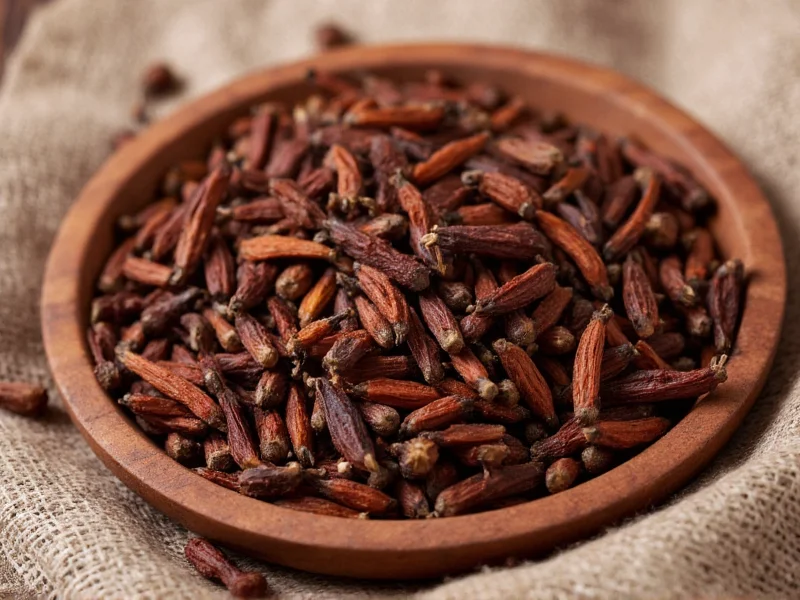Cloves, the aromatic flower buds of the Syzygium aromaticum tree, often confuse people with their intense flavor profile. While many assume "spicy" means heat-inducing like capsaicin in chili peppers, cloves operate differently in our sensory experience. Understanding are cloves spicy or hot requires distinguishing between actual heat and pungency.
What Cloves Actually Taste Like
Cloves deliver a complex flavor experience that's simultaneously sweet, bitter, and warming. The primary compound responsible for their distinctive taste is eugenol, which makes up 70-90% of clove essential oil. This phenolic compound creates a sensation often mistaken for spiciness but differs fundamentally from the capsaicin-induced burn of chili peppers.
When you bite into a whole clove, you'll experience:
- An initial sweet aroma
- A strong, penetrating warmth that spreads through your mouth
- A slight numbing effect on the tongue
- Bitter notes as the flavor develops
- A lingering medicinal aftertaste
The Science Behind Clove's Sensation
Eugenol, the main component in cloves, interacts with TRPV1 receptors—the same receptors activated by capsaicin in hot peppers. However, eugenol works differently. While capsaicin triggers a burning sensation by directly stimulating pain receptors, eugenol initially creates a warming sensation followed by mild numbing.
This explains why why do cloves feel hot is a common question—cloves produce warmth without actual heat. The sensation is more accurately described as pungent rather than spicy. Pungency refers to a strong, sharp flavor that stimulates the senses, while spiciness specifically denotes heat from capsaicinoids.
| Characteristic | Cloves | Chili Peppers |
|---|---|---|
| Primary Compound | Eugenol | Capsaicin |
| Heat Level (Scoville) | 0 SHU | 100-2,000,000+ SHU |
| Sensory Experience | Warming, numbing | Burning, stinging |
| Flavor Profile | Sweet, bitter, medicinal | Fruity, earthy, varying heat |
Culinary Applications of Cloves
Chefs value cloves for their ability to add depth and complexity to dishes without introducing actual heat. Understanding are whole cloves spicy helps in proper usage—they're typically used whole in braises, stews, and rice dishes, then removed before serving, as their intense flavor can dominate a dish.
Common culinary uses include:
- Adding to mulled wine and cider for warmth without heat
- Studding hams and roasts for aromatic flavor
- Creating spice blends like garam masala and pumpkin spice
- Flavoring rice dishes such as biryani
- Preserving and pickling due to antimicrobial properties
Why People Mistake Cloves for Spicy
The confusion around is clove considered spicy stems from several factors:
First, culinary language often uses "spicy" broadly to describe any strong flavor, not just heat. Second, the warming sensation from eugenol can feel similar to mild heat initially. Third, cloves frequently appear in spice blends alongside genuinely hot ingredients like chili peppers.
This misunderstanding leads many to expect heat when using cloves in recipes, only to discover their flavor works differently. Recognizing the distinction between pungency and actual spiciness helps cooks use cloves more effectively in their culinary creations.
Using Cloves Effectively in Cooking
Because cloves have such a potent flavor, they require careful handling. A few tips for working with cloves:
- Use whole cloves for controlled flavor infusion—they're easy to remove after cooking
- Grind cloves fresh for maximum flavor impact in spice blends
- Limited to 2-4 whole cloves per pound of meat or quart of liquid to avoid overpowering
- Pair with complementary spices like cinnamon, nutmeg, and star anise
- Remove whole cloves before serving to prevent unpleasant bites
Understanding clove flavor profile helps explain why they work so well in both sweet and savory applications. Their warming quality enhances other flavors without overwhelming them with heat, making cloves versatile across global cuisines from Indian curries to European baked goods.
Frequently Asked Questions
Do cloves make food hot like chili peppers?
No, cloves do not produce actual heat like chili peppers. They contain eugenol which creates a warming, numbing sensation rather than the burning heat associated with capsaicin in spicy peppers. This warmth is often mistaken for spiciness but operates through different biological mechanisms.
Can I substitute cloves for spicy ingredients in recipes?
Cloves cannot substitute for genuinely spicy ingredients like chili peppers or black pepper if you're seeking heat. However, they can add complexity and warmth to dishes. For recipes requiring actual heat, you'll need to include capsaicin-containing ingredients alongside cloves for complete flavor replication.
Why do my mouth feel numb after eating cloves?
The numbing sensation comes from eugenol, which has mild anesthetic properties. This compound temporarily affects nerve endings in your mouth, creating a cooling or numbing effect rather than burning heat. This is why dentists sometimes use clove oil for toothaches—it naturally numbs pain.
Are ground cloves more potent than whole cloves?
Yes, ground cloves release their flavor compounds more quickly and completely than whole cloves, making them more potent in immediate applications. Whole cloves provide a slower, more controlled flavor infusion as they gradually release eugenol during cooking. For the most intense flavor, use freshly ground cloves, but be cautious with measurements as their potency increases when ground.
Can cloves be too strong in a dish?
Absolutely. Cloves have an extremely potent flavor that can easily dominate a dish if used excessively. Their strong, medicinal quality becomes unpleasant when overused. As a general rule, use no more than 2-4 whole cloves per pound of meat or quart of liquid. Always remember that you can add more cloves during cooking, but you cannot remove their flavor once incorporated.











 浙公网安备
33010002000092号
浙公网安备
33010002000092号 浙B2-20120091-4
浙B2-20120091-4